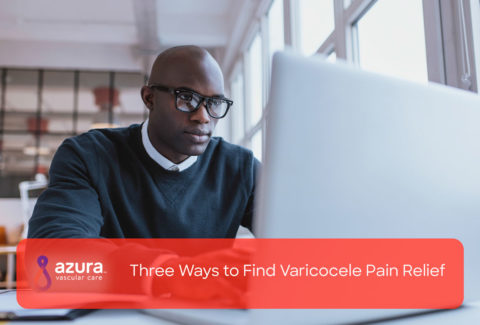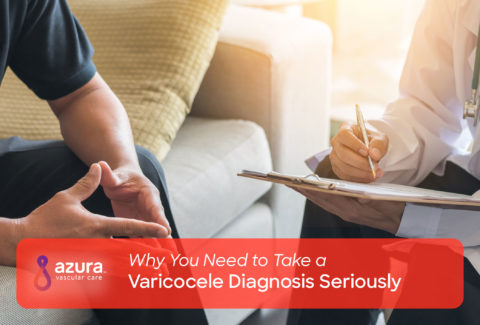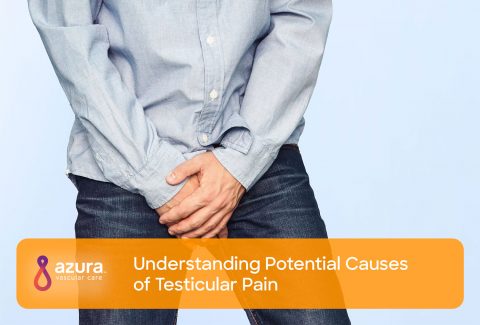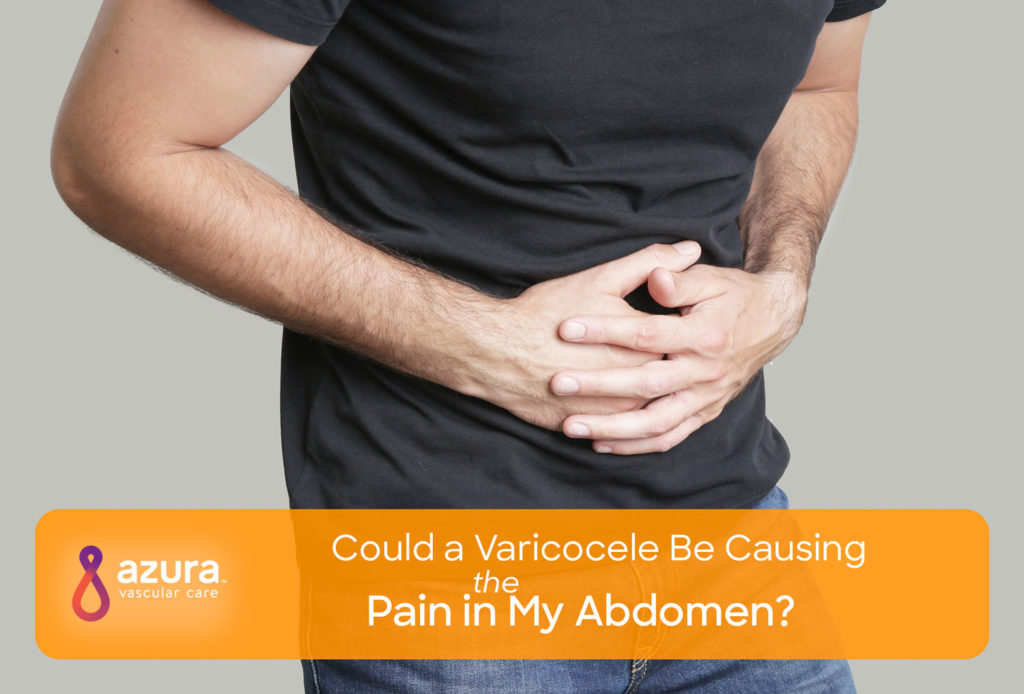
If you’ve been diagnosed with a varicocele, you may be wondering if the pain in your abdomen could be related to this condition and how you can effectively treat it.
A varicocele that’s causing pain in the abdomen can make it hard to keep up with your regular activities. It’s difficult to enjoy an active lifestyle when you often feel sore or uncomfortable. To learn more about the link between varicoceles and abdominal pain, read on.
What Causes a Varicocele?
Varicoceles are caused when the one-way valves in the scrotal veins, which allow blood to flow from the testicles and scrotum back to the heart, become dysfunctional or fail. This causes the blood to pool and the veins around the testicle enlarge to form a varicocele.
When blood flow through the veins of the testicles is abnormal due to a varicocele, backed-up blood flow can cause sensations of pain and pressure.
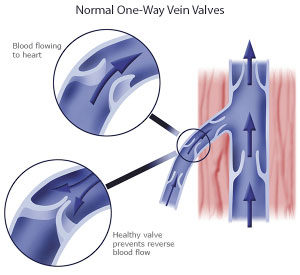
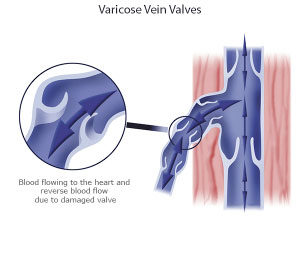
Many men with varicoceles report that their pain is worse when sitting. Sitting down may temporarily increase the pressure in your groin and block blood flow. In contrast, lying down allows blood to flow a bit more easily, so you may notice that your pain lessens when you lie flat.
Understanding The Link Between Varicoceles and Abdomen Pain
Up to 10 percent of men with varicoceles report some type of groin or abdominal pain. (i) Men with varicoceles are more likely to notice pain and swelling on the left testicle and it’s common to feel more varicocele pain when sitting or standing for a long period of time.
The link between varicoceles and pain in the groin and abdomen is not well understood but doctors know that those varicosed veins within the varicocele can sometimes become compressed, thus blocking blood flow. If your varicocele is severe, you may have limited blood flow to the testicles. (ii) Reduced blood flow may trigger chronic or recurring pain in the scrotum and abdomen.
Varicoceles aren’t the only health condition that can cause abdominal pain. Other common causes of abdominal pain may include:
- Testicular torsion
- Appendicitis (iii)
- Hernia (iii)
- Gallstones (iii)
- Urinary tract infection (iii)
- Gastrointestinal disorders (iii)
New or worsening pain should always be reported to your doctor. If your pain is accompanied by symptoms like fever, vomiting, or blood in the urine you should seek medical attention right away. These can be signs of a medical emergency. (iv)
Should I Seek Treatment for My Varicocele?
If your doctor determines that your abdominal pain is due to a varicocele, there is good news—varicoceles are highly treatable. The right treatment can help reduce or even eliminate your pain.
Not all varicoceles cause symptoms. You and your doctor should work together to decide whether you should seek treatment. If your varicocele isn’t currently causing symptoms, your doctor may recommend delaying treatment.
Varicoceles have been linked to chronic pain, infertility, and low testosterone. (ii) These symptoms can interfere with your sex life. They can also limit your ability to keep up with physical activities. If you’re experiencing unwelcome symptoms or worried about your fertility, it may be time to seek treatment.
What Are My Treatment Options?
In the past, varicocele treatment options were limited to surgical procedures. With medical advancements, however, varicocele embolization, a minimally invasive treatment, is another option. Your recommended treatment will often depend on the severity of your symptoms.
Mild varicocele symptoms may not require treatment. Over-the-counter medications might be enough to manage your symptoms. Nonsurgical treatment plans usually involve rest, anti-inflammatory medications, and limiting physical activity. (v)
For a good number of men, limiting physical activity isn’t always an option. Many patients prefer to avoid open surgery whenever possible. In that case, varicocele embolization may provide the relief you’re looking for.
What Is Varicocele Embolization?
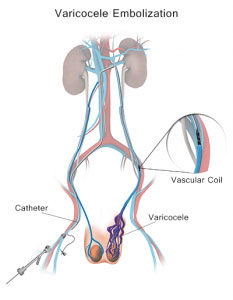
Varicocele embolization is a minimally invasive procedure that can help eliminate unwelcome varicocele symptoms. (vi) During this procedure, a vascular specialist inserts a thin catheter through the femoral vein in your groin. The catheter is directed to the affected vein in your scrotum and a small, metallic coil is inserted, often with a special sclerosing fluid, to block blood flow and reduce pressure on the varicocele.
This treatment can help relieve pain and swelling caused by varicoceles, including pain in the abdomen. By reducing the pressure inside the testicles, it can also aid in resolving symptoms like infertility and low testosterone. (vii)
Which Treatment Should I Choose?
A vascular specialist can help you determine which treatment is best for you. If you’re struggling with varicocele symptoms or worried about potential health risks, don’t put off seeing a doctor!
Varicocele embolization and varicocele surgery boast a 90 percent success rate. (viii) After treatment, many patients report immediate relief from swelling or varicocele pain. Don’t suffer through your symptoms in silence. Varicocele treatment provides relief from even the most frustrating varicocele symptoms.
Is your varicocele causing abdomen pain? Ready to learn more about treatments that can help you feel your best? Call 844-705-VEIN (8346) today to schedule an appointment with a vascular specialist.
Sources:
(i) Abrol, N., Panda, A., & Kekre, N. S. (2014, October 1). Painful varicoceles: Role of varicocelectomy. Retrieved August 6, 2018, from https://www.ncbi.nlm.nih.gov/pmc/articles/PMC4220373/
(ii) Stanford Health Care. Varicocele. Retrieved August 1, 2018, from https://stanfordhealthcare.org/medical-conditions/mens-health/varicocele.html
(iii) Mayo Clinic. (2018, January 3). Abdominal pain: Causes. Retrieved August 6, 2018, from https://www.mayoclinic.org/symptoms/abdominal-pain/basics/causes/sym-20050728
(iv) Mayo Clinic. (May 5, 2018). Testicular torsion. Retrieved August 6, 2018, from https://www.mayoclinic.org/diseases-conditions/testicular-torsion/symptoms-causes/syc-20378270
(vi) John Hopkins Medicine. Varicocele embolization. Retrieved August 1, 2018, from https://www.hopkinsmedicine.org/healthlibrary/test_procedures/urology/varicocele_embolization_135,383
(v) Mayo Clinic. (2017, December 27). Varicocele. Retrieved July 26, 2018, from https://www.mayoclinic.org/diseases-conditions/varicocele/diagnosis-treatment/drc-20378772
(vii) Kumar, N., & Singh, A. K. (2015). Trends of male factor infertility, an important cause of infertility: A review of the literature. Retrieved July 31, 2018, from https://www.ncbi.nlm.nih.gov/pmc/articles/PMC4691969/
(viii) Halpern, J., Mittal, S., Pereira, K., Bhatia, S., & Ramasamy, R. (2015, December 8). Percutaneous embolization of varicocele: Technique, indications, relative contraindications, and complications. Retrieved August 6, 2018, from https://www.ncbi.nlm.nih.gov/pmc/articles/PMC4770492/

